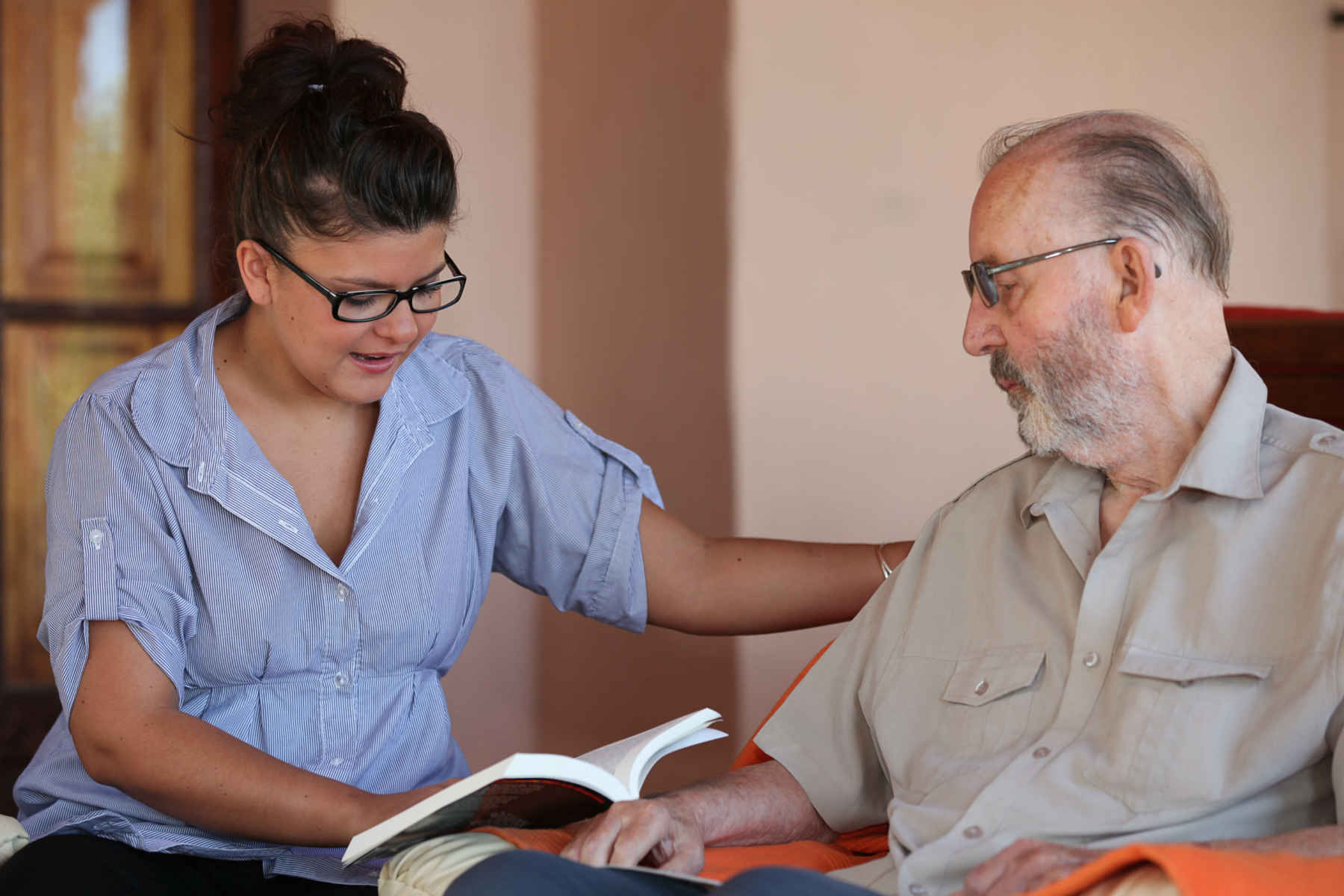Chaplaincy Certificate Programs at Central Seminary
English | 100% Online | 18 credits
Are you thinking about a new vocation to care for people and their loved ones? Do you love helping people through conversation and prayer? Consider preparing for your career in chaplaincy through one of Central Seminary’s certificate programs in chaplaincy.
Where do chaplains serve? You can find chaplains in a variety of settings, including hospitals, hospice care, retirement communities, fire/police, military, corporate, corrections, sports, marketplace, veterans, camps, and government. Wherever people require spiritual care, a chaplain can play a vital role in helping individuals and their families through difficult times.
Choose from Two Certificates in Chaplaincy at Central Seminary
Select from the non-degree, for-credit Graduate Certification Program or the non-degree, not-for-credit Professional Certification Program. Certificates are designed to provide a basic theological and biblical foundation for pastors, church leaders, and prospective students who desire to develop chaplaincy skills.
Students can earn their certificates solely through our online interactive platforms. Central’s online education connects you with instructors and learning colleagues live through video conferencing. You can submit all of your coursework and interact with peers from your own home or place of work.
Each certificate’s curriculum will guide students in developing a professional-level identity for caregiving, understanding ethical boundaries, honing their ability to comprehend human needs, and integrating biblical and theological reflection into their vocational lives.
Graduate Certificate in Chaplaincy
Central’s Graduate Certificate in Chaplaincy is a non-degree, for-credit program designed for individuals interested in employment or working toward board certification as a chaplain. Anyone intending to seek professional work as a chaplain is strongly encouraged to complete the Master of Divinity (MDiv) and graduate chaplaincy certificate program (learn more below).
The Graduate Certificate provides a free-standing credential or can be combined as part of the Master of Arts (Theological Studies), Master of Divinity, or Master of Arts in Counseling degree programs.
Learning Outcomes
Students graduating from Central Seminary’s Chaplaincy Certificate program will:
- Provide professional ministry presence to individuals in a diverse multicultural society and in varied settings.
- Practice professional ethical boundaries in chaplaincy settings.
- Exercise the skills and sensibilities for human spirituality needed to establish and maintain rapport with patients.
- Be grounded in a healthy integration of multiple interpretative horizons in biblical and theological reflection.
- English Language Offered: English
- 18 Credits Program Length: 18 credits - 1 year (full-time status = 6 or more credits per term)
- Three 12-Week Terms Calendar: Three 12-week terms per academic year. New students can begin in any term. Terms begin in August, January, or May.
| Session | Start Date | Application Deadline |
|---|---|---|
| Easter 2024 (May-July) | May 6, 2024 | April 15, 2024 |
Tuition
$395 per credit (23-24 academic year)
Registration Fee
$250 per term
Graduation Fee
$200
Start your application anytime. Classes start in August, January, and May. Application, character references, and an autobiographical statement will be required. For admission to the graduate certificate program, applicants should have a bachelor’s degree from an accredited educational institution.
The following courses can be taken in any order with the practicum occurring in the final term of the program:
- Introduction to Chaplaincy
- Chaplaincy in Hospice and Elder Care
- The Helping Relationship
- Caring Ministries
- Ethics
- Practicum (this course generally requires in-person attendance hours at a practicum site)
A limited number of students without an earned baccalaureate degree or its equivalent may be admitted to a certificate program through completion of coursework in the Diploma in Theological Studies program. Students participating in the English program for whom English is not their first language will be required to demonstrate their English proficiency.

Julie J. Kilmer
Chaplaincy Certificate Director & Supplemental Associate Professor of Theology and Ethics
Professional Certificate in Chaplaincy
The Professional Certificate in Chaplaincy is a non-degree, not-for-credit program designed for persons interested in caregiving skills, volunteering as a chaplain, or possible part-time employment as a chaplain (limited to specific types of chaplaincy).
Learning Outcomes
The Professional Certificate in Chaplaincy is a free-standing certificate. Students graduating from Central Seminary’s Chaplaincy Certificate program will:
- Provide professional ministry presence to individuals in a diverse multicultural society and varied settings.
- Practice professional ethical boundaries in chaplaincy settings.
- Exercise the skills and sensibilities for human spirituality needed to establish and maintain rapport with patients.
- Be grounded in a healthy integration of multiple interpretative horizons in biblical and theological reflection.
- English Language Offered: English
- 6 Courses Program Length: 6 courses, 1 year. Students in the Professional Certificate will not earn credit.
- Three 12-Week Terms Calendar: Three 12-week terms per academic year. New students can begin in any term. Terms begin in August, January, or May.

| Session | Start Date | Application Deadline |
|---|---|---|
| Easter 2024 (May-July) | May 6, 2024 | April 15, 2024 |
Tuition
$600 per course (Payment plans are available)
Registration Fee
$250 per term
Start your application anytime. New students can join in any term in August, January, or May. Application requirements include a completed application, character references, and an autobiographical statement.
The following courses can be taken in any order with the practicum occurring in the final term of the program:
- Introduction to Chaplaincy
- Chaplaincy in Hospice and Elder Care
- The Helping Relationship
- Caring Ministries
- Ethics
- Practicum (this course generally requires in-person attendance hours at a practicum site)

Julie J. Kilmer
Chaplaincy Certificate Director & Supplemental Associate Professor of Theology and Ethics
Combining the Chaplain Certificate With a Degree
If you are interested in obtaining a degree, you may be able to either integrate the Certificate in Chaplaincy coursework into your degree curriculum plan or take a few extra courses to complete both. Explore this option as part of the following programs:
- Master of Divinity (MDiv): Complete the MDiv degree plus Introduction to Chaplaincy, Chaplaincy in Hospice and Elder Care, and The Helping Relationship.
- Master of Arts in Counseling (MACO): Complete the MACO degree plus Introduction to Chaplaincy, Chaplaincy in Hospice and Elder Care, Caring Ministries, and Ethics.
- Master of Arts (Theological Studies): Complete the degree with an emphasis in Chaplaincy.
Chaplaincy Program Career Path
Chaplains serve in a variety of settings, including hospitals, hospice care, retirement communities, fire/police, military, corporate, corrections, sports, marketplace, veterans, camps, and government. Wherever people require spiritual care, a chaplain can play a vital role in helping individuals and their families through difficult times.
If you already have a graduate theological or divinity degree or are seeking the tools from this program for work or volunteering in your current context, the standalone certificate may work well for you. If you are hoping to obtain full-time or paid work as a board-certified chaplain, you may want to combine this program with one of the degrees above. Our student success team would be happy to discuss your goals and educational options with you.
Testimonials
As Chaplain, I do not just minister to Christians. I minister to people of all faith, no faith, and everything in between. As a Chaplain, I have to be able to meet them where they are at and connect with their spiritual resources.
Joy Freeman
MDiv ’01
Why Choose Central Seminary for Your Chaplaincy Training?
Discover the benefits of completing a chaplaincy certificate at Central Seminary. If you are ready to discuss your options with an admissions counselor, contact us today. We want to talk with you about your future in chaplaincy.
Accredited Chaplaincy Program
Central Seminary is fully accredited by the Higher Learning Commission (HLC) and Association of Theological Schools (ATS). Our programs are recognized throughout the field as comprehensive and adequate in preparing individuals for other schools or lifelong careers.
Experienced Chaplain Educators
Our faculty have years of experience helping to develop chaplains as they progress in their careers. Not only do we help you through the necessary courses, but our professors also provide additional tools that can help you succeed beyond the knowledge you need to earn your certificate.
Established and Proven Online Learning Structure
Our curriculum is accessible even for students with busy lives. User-friendly tools, cooperation with in-person students, and flexible asynchronous courses help to make our mission more impactful. We believe—and have proven with online education since 2010—that innovative, adaptable ministry is beneficial to the cause.
Chaplain Program Scholarships and Funding
In addition to our excellent tuition rates, we also offer payment plans to accommodate students who might be otherwise unable to attend. If you combine the graduate certificate course with a degree program, you can also qualify for scholarships.
Learn With a Reasonable Schedule
You only need to attend your classes two nights a week to finish either program in a single year. This means you will still have plenty of time to work and gain experience in the field. We have credit and non-credit programs available to suit your needs, and the ability to take classes online lets you learn from anywhere.
Be a Part of a Diverse Student Body
We have students from a wide range of backgrounds that come to Central Seminary to learn. These perspectives can help shape your experience to be more unique than a one-dimensional program.
Chaplaincy Program FAQ
Learn more about Chaplaincy Certificate programs at Central Seminary.
What is the role of a chaplain?
Chaplains are guides who help individuals tap into their psycho-spiritual needs. They use people’s beliefs to motivate them through their difficulties. Even those who are not looking for faith-based counseling may be able to benefit from the presence of a chaplain.
What training and experience are required to be a chaplain?
Although many chaplains are ordained ministers, this training is not required to work as a chaplain. However, endorsement from a faith group is often required. An endorsement may be obtained after satisfying specific education and training objectives outlined by an authority in a specific church or faith tradition.
Educational requirements vary depending on the type of chaplaincy. For example, military chaplains need a master’s degree with a minimum of 72 hours in theology and ministry (MDiv), while an entry-level chaplain at a camp or workplace may only require a bachelor’s degree along with specific classes in chaplaincy.
A volunteer position or part-time position as a chaplain in hospice or retirement communities may not require a bachelor’s or master’s degree or board certification—although they are helpful.
Where do chaplains serve?
- Hospitals
- Retirement communities
- Fire/police stations
- Military bases
- Corporate offices
- Corrections facilities
- Athletic departments
- Marketplaces
- Veteran organizations
- Bereavement/grief clinics
- Camps
- Government buildings
How do I become a board-certified chaplain?
Many professional chaplaincy organizations offer certification, including the largest organization, Association of Professional Chaplains (APC). The APC’s board-certified Chaplain program provides you with the opportunity to become board certified through an extensive educational program, including four units of Clinical Pastoral Education.
Although certification is not always required, it demonstrates that you have education, training, and experience in chaplaincy and will make you more marketable when it is time to find a job.
How do I choose between a graduate and professional certificate program?
Both the graduate and professional certificate programs are the same length and include the same courses. The choice you make should depend on what you would like to do after you’ve finished.
If you are working towards becoming a board-certified chaplain, you will want the credits offered by the graduate program. If you are looking to gain the skills for volunteering or caregiving purposes, you should opt for the professional certificate.
Enroll in Our Chaplaincy Program Today
If you are thinking about chaplaincy, contact us today. Central Seminary has over 100 years of history launching students into the world to be a loving presence for people who are hurting. Let us be a part of your educational and vocational journey.